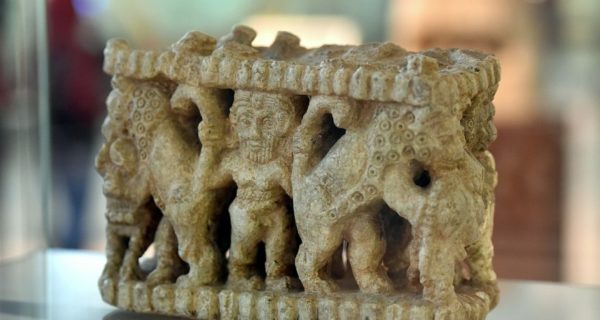[E]xamine its foundation, inspect its brickwork thoroughly. Is not (even the core of) the brick structure made of kiln-fired brick…
Describing the durability and permanency of a brick wall, The Epic of Gilgamesh is the definitive story of man’s quest for immortality. Those last thirteen words are both a summary and an interpretative analysis of this ancient Mesopotamian poem, compiled mostly by the poet Sin-liqe-unninni. But of course, any summary-interpretative essay on a piece of literature should be a little longer, even one discussing a saga that conveys the briefness of life. Those thirteen words, for one, don’t explain how vital The Epic of Gilgamesh is to our understanding of world history and a shared human experience. As a tale of man’s mortality, we can be sure that it is crucial to both.
The Epic of Gilgamesh is the story of a remarkable but oppressive ruler who is fated for distress when his people plead with the gods to provide a rival who can overpower him and give them their freedom. The rival the gods create, a shaggy creature named Enkidu, ends up being Gilgamesh’s best friend when they literally kiss and make up after a scuffle over Gilgamesh’s right to bed another man’s bride, the fulfillment of one of two dreams the king has had about Enkidu.
Enkidu used to live with the wild animals in the wilderness, but was “softened” when he was seduced by a prostitute who brought him to civilisation. He accompanies Gilgamesh on a fame-seeking quest to overcome Humbaba, the ogre guardian of a cedar forest who is terrorising the people, and interprets his companion’s frightening dreams as omens of good fortune. They kill the ogre and chop down his tallest cedar tree. However, they must prove their prowess yet again upon their return to their city of Uruk-Haven, when the goddess of Uruk, spurned by Gilgamesh, brings down the Bull of Heaven to kill him. Enkidu intercepts the bull, fulfilling Gilgamesh’s second dream, which predicted that Enkidu would save him.
Working together, they slay the beast, but Enkidu has a nightmare of the Underworld following their victory celebration, and knows that he is doomed by the angry gods to die. He succumbs to sickness, and Gilgamesh is left devastated and afraid for his own life. He wanders through the wilderness, searching for his ancestor Uta-napishti, who gained eternal life. After an encounter with a scorpion who is reluctant to allow him through the mountain passes, Gilgamesh reaches the ocean, where the “tavern-keeper” goddess Shiduri directs him to a ferryman who might take him across the sea to where his ancestor dwells. The two men make the journey, and Gilgamesh informs Uta-napishti of his tribulations and desires. Uta-napishti tells Gilgamesh how he was saved from the god Enlil’s flood, and was given immortality by him. He concludes to the younger man that death is inevitable and preordained, and that it is destructive to waste time worrying about it, because no one knows what hour he will die.
To emphasise his point, he challenges Gilgamesh to go without sleep for six days and seven nights. However, Gilgamesh falls asleep as soon as he sits down. Uta-napishti rouses him after seven nights. Gilgamesh is despondent, but his ancestor cleans him and dresses him up for his journey back to Uruk-Haven. He tells him about a thorny plant that will restore the youth he has lost during his travails. Unfortunately, a snake steals the plant mid-journey, and Gilgamesh mourns the fact that he has nothing to show for himself. When he and the ferryman finally arrive back at Uruk-Haven, Gilgamesh invites the older man to go up on the wall of the city which, he realises, is his most impressive and lasting accomplishment.
Gilgamesh has to content himself with a brick wall when he finds that he can’t escape his mortality. His story is central to our understanding of world history and shared human experience because it is the depiction of man’s most innate fear and inevitable fate, the fear and the fate that have accompanied him since he first cursed himself with them after the Fall. The fear of death is an apprehension that lurks in our subconscious, and is one of the most excruciating “pulses” of life. Everything mankind has done and is doing (as basic creatures devoid of religious consciousness) either has been or is an attempt to “live on” in some way or to forget that it is going to die. The fear of death is one we are all familiar with and are doomed to experience at one point or another.
The Epic of Gilgamesh is important because it discusses a concept that is, ironically, at the foundation of life, which is the basis for both human history and human experience. It is the final and ultimate shared human experience. The Epic also carries the narrative of the flood, which is an additional instance of human mortality and a hint at our common heritage.
But this saga is similarly important as an illustration of man’s reaction to his mortality. Gilgamesh ends up learning that he has to die, as we all do, but he finds comfort in the wall he has built around his city, just as each one of us finds comfort and distraction in the fleeting things of every day.

